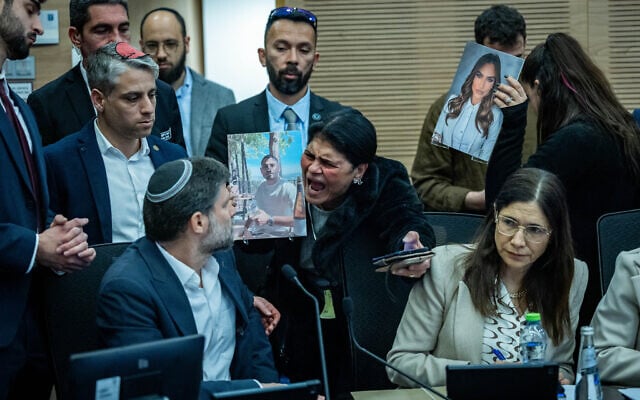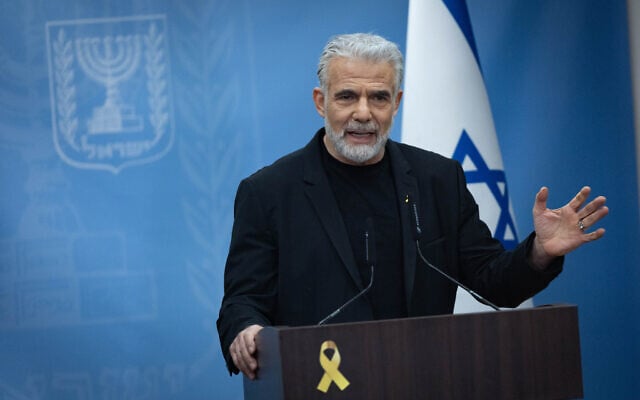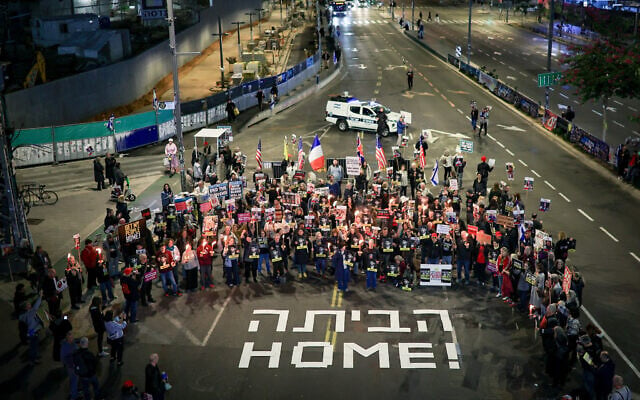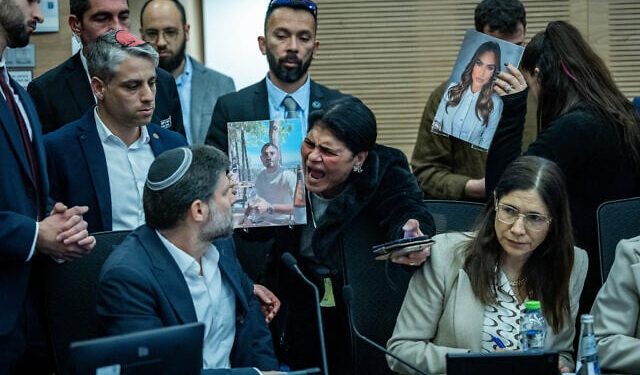National Security Minister Itamar Ben Gvir sparked an outcry Monday when he claimed he had repeatedly foiled a ceasefire deal with Hamas over the past year, while calling on the minister of Finance Bezalel Smotrich to join him again to thwart a nascent agreement.
Ben Gvir’s comments drew sharp criticism from relatives of a number of hostages and opposition lawmakers who have long accused Prime Minister Benjamin Netanyahu of balking at a ceasefire deal. in order to preserve his coalition. Ben Gvir and Smotrich have previously said they would overthrow the government rather than accept a deal ending the war against the Palestinian terrorist group Hamas in the Gaza Strip, but Smotrich has not specifically reiterated that threat in recent days .
In an article on X, accompanied by a video in which he called on his far-right ally Smotrich to join him in telling Netanyahu that they would leave the coalition if the current hostage deal proposal passed, Ben Gvir said they had managed to end previous efforts to reach an agreement.
“I call on my colleague, Minister Bezalel Smotrich, to join forces with me and together we will work against the emerging agreement,” he said.
“Last year, using our political power, we managed to prevent this deal from happening, time and time again,” he said.
However, Ben Gvir said he now lacked the power to end what he called the “surrender deal” because Netanyahu expanded the coalition by appealing to the minister’s New Hope party. Foreign Affairs Gideon Saar in September last year.
“Recently, other actors in favor of the agreement have joined the government, and we no longer hold the balance of power,” he lamented.

Rachel Moshe, the mother of Oz Ezra Moshe who was murdered in the Nova massacre, shouts at Finance Minister Bezalel Smotrich during a Finance Committee meeting in the Knesset, January 13, 2025. (Yonatan Sindel /Flash90)
“Otzma Yehudit alone does not have the capacity to prevent an agreement from being reached. I propose that we go together to see the Prime Minister and inform him that if he adopts the agreement, we will resign from the government,” Ben Gvir said, addressing Smotrich.
“I emphasize that even though we are in opposition, we will not overthrow the Prime Minister, but this cooperation is our only way to prevent the surrender agreement… and to ensure that the death of hundreds of soldiers is not in vain,” said Ben Gvir. said.
In his message, Ben Gvir listed the reasons why he opposed the proposed three-phase deal, which would see the release of dozens of hostages held in Gaza, both alive and dead.
Ben Gvir said the agreement, which will include the release of hundreds of Palestinian security prisoners from Israel, would enable the rehabilitation of terrorist groups in Gaza and bring the threat back to residents of the border areas. He also warned that the current deal does not immediately guarantee the release of all hostages held in Gaza, saying it “seals the fate of the rest of the hostages who are not included in the death deal.”
The two far-right parties ran together in the last election, but operate independently. Ben Gvir and Smotrich have also disagreed in recent weeks over budgetary funding for the police, which reports to the Ministry of National Security.
Although Smotrich did not immediately respond publicly to Ben Gvir’s call, he on Monday called the deal a “disaster.”
Ben Gvir’s comments on the failure of the agreements quickly sparked outrage.
“He openly admits that he ended a deal with his own hands for political gain,” said Gil Dickmann, a close friend of Carmel Gat, who was killed by his captors in a Gaza tunnel last year. last. “Without him, Carmel would be alive today.”

Israelis whose family members have been kidnapped by Hamas terrorists in Gaza since October 7 attend a Knesset National Security Committee hearing on November 20, 2023. At center is Gil Dickmann, whose cousin Carmel Gat is one of the hostages. (Yonatan Sindel/Flash90)
Dickmann called on Netanyahu and Smotrich not to give in to Ben Gvir’s “bloodsucker.”
The Israeli military estimated that Hamas guards murdered Gat and five other captives last September as IDF troops closed in on the scene.
Opposition leader Yair Lapid said Ben Gvir’s comments proved his claims that the government had failed to reach a deal for political reasons. Netanyahu and the government have long denied the allegations, blaming Hamas for the lack of a deal.
“For over a year I have been saying that they cannot reach a hostage agreement for political reasons and everyone is telling me that this cannot be possible, that it is shocking and how could I say such a thing,” Lapid said on X.
“And today, Ben Gvir plays a video and tells the camera, without batting an eyelid, that this is the terrible truth,” he said.

Opposition leader and head of the Yesh Atid party, MK Yair Lapid, leads a faction meeting at the Knesset in Jerusalem, January 6, 2025. (Yonatan Sindel/Flash90)
For his part, Agriculture Minister Avi Dichter rejected the idea that Ben Gvir and Smotrich would have the ability to terminate the current agreement.
“Ben Gvir and Smotrich know very well that their votes will not decide the return of our children from Gaza,” he wrote on !”
Dichter promised that the cabinet would ensure that all hostages, “down to the last of them, return to their families.”
The deal would reportedly require security cabinet and government approval, but not a Knesset vote. Members of Netanyahu’s government would likely vote in favor of a deal even if the two far-right leaders opposed it.
The Kan public broadcaster reported that Smotrich was scheduled to meet with Netanyahu later Tuesday about the hostage deal.

Religious Zionist party leader MK Bezalel Smotrich (R) with Otzma Yehudit party leader MK Itamar Ben Gvir during a vote in the Knesset in Jerusalem, December 28, 2022. (Olivier Fitoussi/Flash90 )
Sources close to Smotrich said the minister had deliberated on the details and ramifications of the deal and would make a decision independent of the political consequences.
Following swirling reports indicating a major breakthrough in negotiations on Monday, Smotrich warned that the far-right Religious Zionism party he leads would not accept a deal that he said would constitute a “catastrophe for national security.” ‘Israel’.
On Sunday, a political source told the Walla newspaper that Netanyahu hoped to convince Smotrich to stay in the coalition even though he did not support a deal, with observers assuming Ben Gvir would leave the government after voting against the deal. Lapid promised a “safety net” to allow Netanyahu to push forward with a deal even if the coalition loses its majority in the Knesset.

Protesters call for the release of Israeli hostages held by Hamas in the Gaza Strip, outside the IDF Kirya headquarters in Tel Aviv, January 13, 2025. (Itai Ron/Flash90)
An estimated 94 of the 251 hostages kidnapped by Hamas on October 7, 2023 are still in Gaza, including the bodies of at least 34 dead confirmed by the IDF. The hostages were kidnapped when Hamas led thousands of terrorists in a devastating attack on Israel that killed 1,200 people, mostly civilians.
Hamas freed 105 civilians during a week-long truce in late November, and four hostages had previously been freed. Eight hostages were rescued alive by troops, and the bodies of 40 hostages were also found, including three mistakenly killed by the Israeli army while trying to escape their captors.
Hamas also holds two Israeli civilians who entered the Gaza Strip in 2014 and 2015, as well as the bodies of two IDF soldiers killed in 2014.


